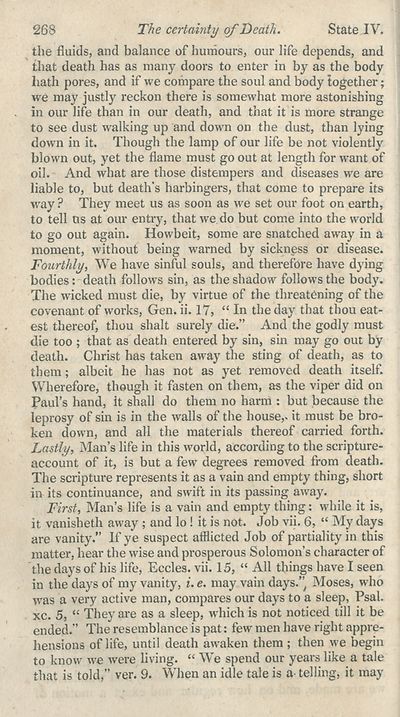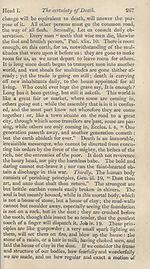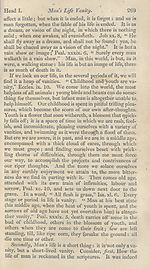Download files
Complete book:
Individual page:
Thumbnail gallery: Grid view | List view

268 The certainty of Death. State IV.
the fluids, and balance of humours, our life depends, and
that death has as many doors to enter in by as the body
hath pores, and if we compare the soul and body together;
we may justly reckon there is somewhat more astonishing
in our life than in our death, and that it is more strange
to see dust walking up and down on the dust, than lying
down in it. Though the lamp of our life be not violently
blown out, yet the flame must go out at length for want of
oil. And what are those distempers and diseases we are
liable to, but death's harbingers, that come to prepare its
way? They meet us as soon as we set our foot on earth,
to tell ns at our entry, that we do but come into the world
to go out again. Howbeit, some are snatched away in a
moment, without being warned by sickness or disease.
Fourthly, We have sinful souls, and therefore have dying
bodies: death follows sin, as the shadow follows the body.
The wicked must die, by virtue of the threatening of the
covenant of works, Gen. ii. 17, “ In the day that thou eat-
est thereof, thou shall surely die.” And the godly must
die too ; that as death entered by sin, sin may go out by
death. Christ has taken away the sting of death, as to
them; albeit he has not as yet removed death itself.
Wherefore, though it fasten on them, as the viper did on
Paul’s hand, it shall do them no harm : but because the
leprosy of sin is in the walls of the house,, it must be bro¬
ken down, and all the materials thereof carried forth.
Lastly, Man’s life in this world, according to the scripture-
account of it, is but a few degrees removed from death.
The scripture represents it as a vain and empty thing, short
in its continuance, and swift in its passing away.
First, Man’s life is a vain and empty thing: while it is,
it vanisheth away; and lo! it is not. Job vii. 6, “ My days
are vanity.” If ye suspect afflicted Job of partiality in this
matter, hear the wise and prosperous Solomon’s character of
the days of his life, Eccles. vii. 15, “ All things have I seen
in the days of my vanity, i. e. may vain days.”, Moses, who
was a very active man, compares our days to a sleep, Psal.
xc. 5, “ They are as a sleep, w hich is not noticed till it be
ended.” The resemblance is pat: few men have right appre¬
hensions of life, until death awaken them; then we begin
to know we were living. “ We spend our years like a tale
the fluids, and balance of humours, our life depends, and
that death has as many doors to enter in by as the body
hath pores, and if we compare the soul and body together;
we may justly reckon there is somewhat more astonishing
in our life than in our death, and that it is more strange
to see dust walking up and down on the dust, than lying
down in it. Though the lamp of our life be not violently
blown out, yet the flame must go out at length for want of
oil. And what are those distempers and diseases we are
liable to, but death's harbingers, that come to prepare its
way? They meet us as soon as we set our foot on earth,
to tell ns at our entry, that we do but come into the world
to go out again. Howbeit, some are snatched away in a
moment, without being warned by sickness or disease.
Fourthly, We have sinful souls, and therefore have dying
bodies: death follows sin, as the shadow follows the body.
The wicked must die, by virtue of the threatening of the
covenant of works, Gen. ii. 17, “ In the day that thou eat-
est thereof, thou shall surely die.” And the godly must
die too ; that as death entered by sin, sin may go out by
death. Christ has taken away the sting of death, as to
them; albeit he has not as yet removed death itself.
Wherefore, though it fasten on them, as the viper did on
Paul’s hand, it shall do them no harm : but because the
leprosy of sin is in the walls of the house,, it must be bro¬
ken down, and all the materials thereof carried forth.
Lastly, Man’s life in this world, according to the scripture-
account of it, is but a few degrees removed from death.
The scripture represents it as a vain and empty thing, short
in its continuance, and swift in its passing away.
First, Man’s life is a vain and empty thing: while it is,
it vanisheth away; and lo! it is not. Job vii. 6, “ My days
are vanity.” If ye suspect afflicted Job of partiality in this
matter, hear the wise and prosperous Solomon’s character of
the days of his life, Eccles. vii. 15, “ All things have I seen
in the days of my vanity, i. e. may vain days.”, Moses, who
was a very active man, compares our days to a sleep, Psal.
xc. 5, “ They are as a sleep, w hich is not noticed till it be
ended.” The resemblance is pat: few men have right appre¬
hensions of life, until death awaken them; then we begin
to know we were living. “ We spend our years like a tale
Set display mode to:
![]() Universal Viewer |
Universal Viewer | ![]() Mirador |
Large image | Transcription
Mirador |
Large image | Transcription
| Antiquarian books of Scotland > Religion & morality > Human nature in its fourfold state > (286) |
|---|
| Permanent URL | https://digital.nls.uk/118587128 |
|---|
| Description | Thousands of printed books from the Antiquarian Books of Scotland collection which dates from 1641 to the 1980s. The collection consists of 14,800 books which were published in Scotland or have a Scottish connection, e.g. through the author, printer or owner. Subjects covered include sport, education, diseases, adventure, occupations, Jacobites, politics and religion. Among the 29 languages represented are English, Gaelic, Italian, French, Russian and Swedish. |
|---|

